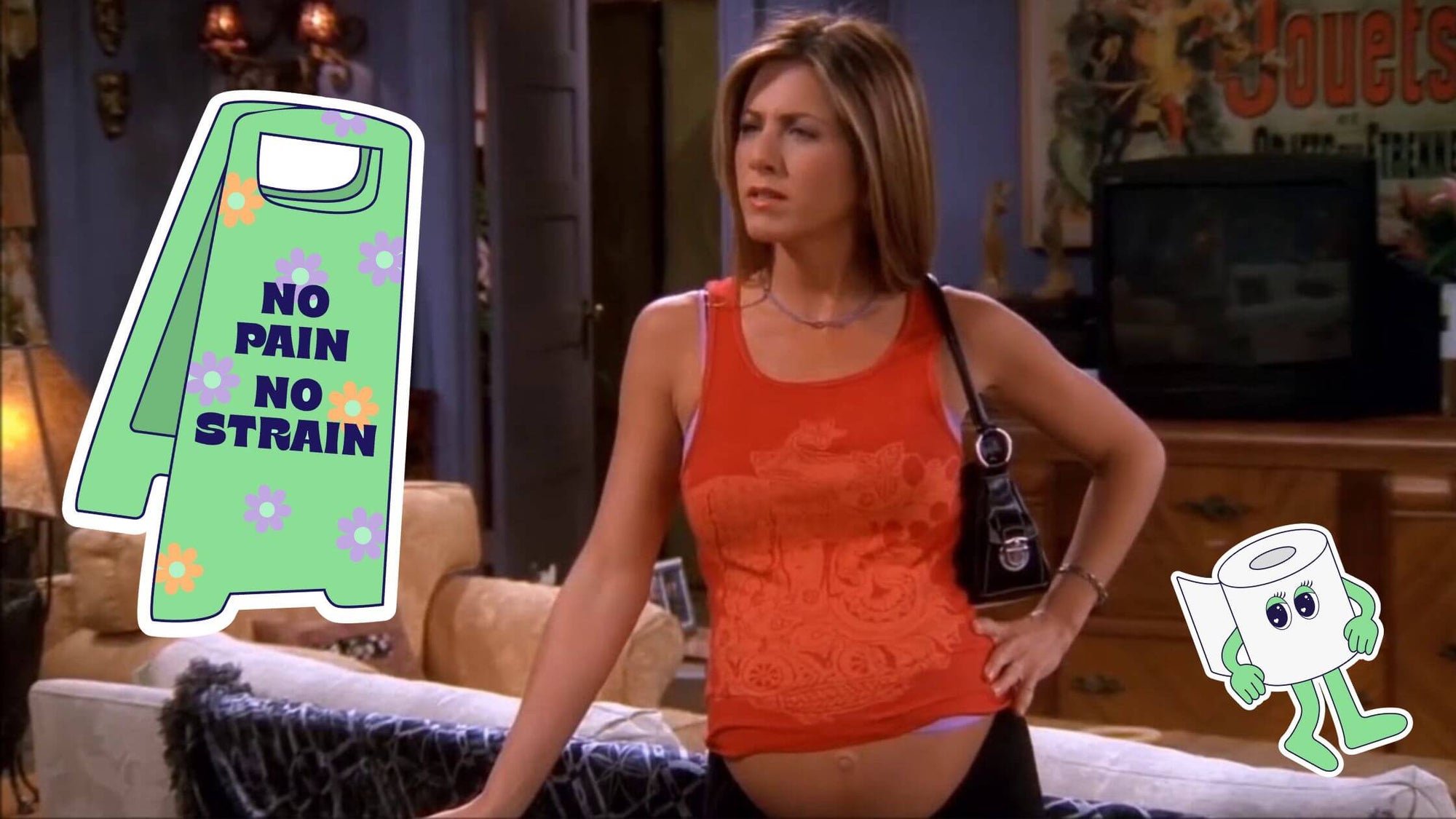Bloating is a common issue that many of us deal with. In fact, it’s so common that it’s become a symptom that many of us don’t take seriously and just accept as a part of life.
However, there are many causes of bloating, some of which are completely innocent, such as the menstrual cycle, menopause, and dietary preferences, and others of which, although rare, can be more sinister in nature. You can feel bloating, which is the feeling of fullness and heaviness in your abdomen, from something as simple as eating too much food.
But bloating is also a common symptom of many digestive health issues like irritable bowel syndrome (IBS) or inflammatory bowel disease (IBD), and even some cancers. Of course, we’re not here to scare you! Bloating is nothing to worry about most of the time, but it’s still important to know why you’re getting bloated and what you can do about it.
Bloating can manifest as puffiness under the skin and a swollen abdomen. It can lead to discomfort, aches, and pains. In this article, we’re going to cover the reasons why you might be experiencing regular bloating and how to tell if it’s excess or water retention causing it.
We will also cover the reasons why water retention occurs in the body and how you can reduce or avoid it.
Why Am I Bloated Constantly?
There are hundreds of things that cause bloating, and this article would be pages and pages long if we discussed all of them in detail! To keep things simple, we’re going to cover the most common reasons why people feel constantly bloated.
Take a read at the causes of bloating and water retention that we’ve discussed below, as one of them might be the culprit causing your digestive issues!
1. Eating a lot of food in a short period of time
We’re starting with the most obvious answer, but eating a large volume of food in a short space of time can lead to temporary bloating. Your stomach and intestines expand to make room for ingested food. It’s not until your digestive enzymes and gut bacteria have broken this food down into smaller molecules, and these molecules have been absorbed into your bloodstream that your bloating subsides.
You might be particularly prone to bloating if you eat a large meal just before bed, and you could find that you’re still a little puffy when you wake up the next morning. This is because it can take longer for food to move through your digestive tract when you’re asleep, as you’re less active than you would be during the day. Plus, you’ve not got the help of gravity to push food down into your lower digestive tract when you’re lying down in bed!
Consider taking a probiotic supplement just before or after your large evening meal so you don’t wake up bloated. Our probiotic supplement, A Dose For Bloating, is the perfect remedy to tackle morning bloating and puffiness. It contains two billion probiotic bacteria, seven different digestive enzymes, and seven plant extracts for maximum effectiveness.
2. Eating gassy foods
Certain foods increase gas production in your colon, leading to excessive bloating, burping, and flatulence. Culprits include cruciferous veggies (such as broccoli, cauliflower, cabbage, kale, and Brussels sprouts), onions, garlic, legumes, salty foods, and fatty foods.
Eating a lot of these foods can worsen your digestive symptoms, especially if you have IBS or Crohn’s disease. You might need to reduce your intake of gas-producing foods if you find that you react quite badly to them.
If you’re unsure how to modify your diet appropriately, speak to a dietician who can offer expert nutritional guidance.
3. Hormonal changes
As important as hormones are, they can be a nuisance and wreak havoc on the digestive tract. In particular, fluctuations and imbalances in thyroid hormones and sex hormones are to blame for excessive bloating and digestive changes.
The thyroid hormones T3 and T4 (mostly T4 as this is the active version of the hormone) are responsible for lots of different functions in the body, one of which is regulating metabolism. If your thyroid hormone levels are chronically low, your digestion will slow down. As a result, you could find that you get bloated and experience water retention in your abdomen more often than now.
Hormonal fluctuations in the female reproductive hormones are another major player in bloating, and it’s these hormones that cause women to experience more digestive issues than men.
A lot of women complain of constant hormonal bloating in the days leading up to their period and during their bleeds. You can thank the natural drop in your oestrogen and progesterone levels for this.
As a woman, you might also experience changes in your bowel habits whilst you’re on your period. Chemical compounds called prostaglandins are released during your period to stimulate the shedding of your uterine lining.
However, these prostaglandins also stimulate the smooth muscle in your colon, increasing the speed at which food moves through your digestive tract. This leads to diarrhoea and more trips to the toilet than usual.
Annoyingly, hormonal fluctuations are part of being a woman. These fluctuations are absolutely essential for your reproductive health, fertility, and overall well-being.
However, if you’re experiencing extreme symptoms around your period, such as severe abdominal cramps, very heavy menstrual bleeding, or migraines, it’s worth speaking to a specialist endocrinologist or gynaecologist for further advice. Severe symptoms could indicate a reproductive health issue or major hormonal imbalance.
4. Certain medications
Some medications increase water retention in the body (including in the digestive tract), exacerbating bloating and puffiness. These medications include non-steroidal anti-inflammatory drugs (NSAIDs), antidepressants, and opioids.
5. Dehydration or excessive alcohol consumption
Although it sounds backwards, being dehydrated can cause your body to retain more water, particularly in your lower digestive tract.
Your body can hold onto more water because it doesn’t have enough available if you’re not drinking water throughout the day. Inadequate fluid intake slows down your digestion, causing food to move more slowly through your intestines and leading to bloating.
Excessive alcohol consumption causes bloating for the same reason. When you drink alcohol, it causes your kidneys to filter more water out of the blood (alcohol is a diuretic). As a result, you need to go to the toilet for a wee more often, and you slowly become dehydrated, even if you continue drinking more alcohol throughout the day or evening.
6. Health conditions affecting the digestive tract
Digestive disorders, such as irritable bowel syndrome (IBS), inflammatory bowel disease (IBD), gastroparesis, and gastroesophageal reflux disease (GORD), can lead to chronic bloating.
The exact mechanism behind why these conditions cause abdominal bloating and distension is unclear, but it’s thought to be a combination of things, including changes in the gut microbiome, inflammation, stress, and genetics.
What Is the Difference Between Bloating From Gas and Water?
Knowing the difference between bloating caused by excess gas and bloating secondary to water retention is key to identifying the root cause of your bloating and managing it effectively.
Bloating from gas occurs when your gut bacteria produce more gas. This might be due to changes in the diversity of bacteria in your gut, changes in your diet where you’re eating more gas-producing foods than usual or swallowing more air whilst you eat.
If you have gas-related bloating, you’ll experience lots of burping and flatulence. This is unlike bloating caused by water retention, which is more likely to cause puffiness and a swollen abdomen. You might also have swelling elsewhere in your body, such as in your lower legs and ankles, if water retention is the issue.
Why Does Water Retention Occur?
Water retention is known as oedema, and you can experience this everywhere, including in your digestive tract. There are lots of things that contribute to increased water retention, including:
- Hormonal changes, particularly increased oestrogen and progesterone, which occur at certain times during the monthly menstrual cycle or during pregnancy
- Certain medications, such as antidiuretics that cause the kidneys to retain more water or antihypertensives that help to regulate blood pressure
- Increased dietary salt intake and low potassium intake
- Leakages of tissue fluid from the capillaries
- Medical conditions, such as heart failure, kidney disease, liver disease, and thyroid disorders
- Being sat down or standing up for long periods of time, causing fluid to pool in the lower extremities.
- Inadequate protein intake and low albumin in the blood which disrupts fluid balance in the tissues and bloodstream
How to Avoid Water Retention
Reducing or eliminating water retention can relieve your discomfort and pain. There are several steps you can take to get rid of fluid build-up in your digestive tract and elsewhere in the body.
Below, we’ve covered some of the best things you can do to reduce water retention, puffiness, and bloating, whether you’re experiencing holiday bloating or digestive problems at home.
Stay hydrated throughout the day by drinking lots of fluids
Your body needs plenty of fluids throughout the day to stay hydrated. To hydrate yourself, keep a bottle of water by your side when you’re working or out and about. Take regular sips so your body has a constant supply of fluids to replace those lost in sweat and metabolic processes.
If you drink lots of coffee or alcohol, you may need to drink more regular water to counteract the diuretic effects of caffeine and alcohol.
Increase your potassium intake and reduce your sodium intake
Potassium and sodium are electrolytes (minerals) that regulate fluid balance in the body. Potassium helps to reduce water retention, while sodium has the opposite effect.
Therefore, consuming more of the former and less of the latter could help to minimise fluid retention in your body. When you increase your potassium intake, you’ll feel less puffy and bloated.
Potassium-rich foods to include in your diet are avocados, bananas, oranges, dried fruit, potatoes, sweet potatoes, and spinach. Try and add these foods to your meals and snacks to optimise your potassium intake.
At the same time, it’s best to reduce your sodium intake when you’re dealing with excessive water retention. Sodium-rich foods include takeaways, junk foods, and pre-packaged foods like ready meals and crisps. You can still enjoy these foods every so often, but limit them wherever possible.
Manage conditions and resolve hormonal imbalances
Digestive disorders, such as IBS and IBD, cardiovascular problems, and chronic kidney disease (CKD), are common causes of water retention. Staying on top of your condition and managing it with the help of a healthcare professional (or a team of qualified professionals) can minimise water retention and keep you as healthy as possible.
Similarly, if you’re dealing with hormonal bloating and the symptoms of hormonal imbalances like those we mentioned above, speak to your doctor to get tested. If your thyroid or reproductive hormones are imbalanced, they could be the cause of your water retention.
A specialist doctor may help you take the right steps to resolve these imbalances and their underlying causes. In many cases, chronic health conditions (such as amenorrhoea, endometriosis, polycystic ovary syndrome, or Hashimoto’s) cause ongoing hormonal imbalances.
You’ll need to manage any hormone-related conditions properly to reduce the effects of hormonal imbalances and eliminate water retention. This may be through medications or lifestyle changes.
Eat smaller meals more frequently
Eating a large meal can lead to temporary boosting and water retention in your gut. As your body breaks down the food you’ve eaten and absorbs the nutrients, you’ll notice that your abdomen goes back down to its original size, and you have no further problems.
However, if you want to get rid of bloating, distension, and discomfort in your abdomen, it’s best to stick with small meals only. Try to eat every three to four hours with snacks splitting up your larger main meals. Eating a smaller volume of food in each sitting gives your digestive tract time to adequately break down the foods you’re eating.









